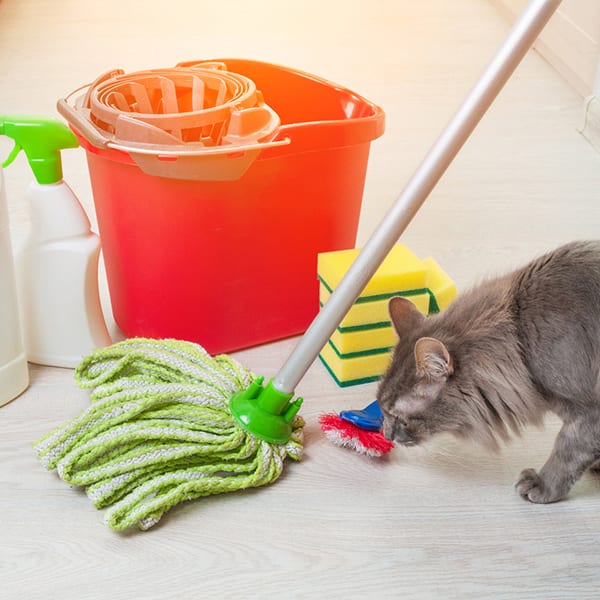Pet Poison Control and Prevention Awareness in Tulsa, OK

March is Pet Poison Prevention month, a time to bring attention to poison control and the potential health hazards that could be residing in your home. Dogs and cats are curious by nature and thus more likely to eat something they shouldn’t. It’s easy to overlook certain hazards due to their constant presence in our daily lives, and the fact that we simply don’t expect our pets to get into the wrong things. As your emergency veterinarian in Tulsa, OK, we’re always prepared to assist with all kinds of emergencies, including the ingestion of poisons.
If you have questions or suspect that your pet has ingested something harmful to their health, call us immediately at 918-665-0508.
Keep an Eye Out for These Common Household Poisons
Not sure what poses a threat to your pet? These are some of the most common (and dangerous) poisons found in most homes.
- Xylitol: This artificial sweetener is found in many edible and non-edible items, including sugar-free gum, breath mints, and candy, baked treats, some peanut butter, vitamins, toothpaste, and mouthwash. Keep your Tic Tacs secure and your toothpaste stored away in a drawer to protect your companion. Ingesting xylitol can cause a severe drop in your pet’s blood sugar and raise their insulin levels, too, which in turn can be deadly.
- Grapes/raisins: Dogs and cats can develop severe kidney failure after eating grapes or raisins, so don’t leave these snacks sitting around!
- Chocolate: Any type of chocolate should be off-limits to your pet, though the greater the cocoa content, the more dangerous the chocolate will be. Consuming too much can give your pet muscle spasms, an erratic heartbeat, and potentially lead to seizures.
- Onions and garlic: Raw onions and garlic or foods containing large amounts of these vegetables can affect your pet’s red blood cells, causing anemia, and in a worst case scenario, be fatal.
- Flowers and plants: There’s a wide variety of plant life that can fall into this category, including true lilies (Daylilies, Easter lilies, Western lilies, Stargazer and Tiger lilies), Buttercup, Azaleas, Autumn Crocus, Sago palm, Oleander, Lily of the Valley, Daffodil, and Hemlock. Be careful about bringing flowers into your home, and check your yard for any signs of poisonous plants including Poison Ivy, Poison Oak, and Poison Sumac. For a more detailed list of toxic plants, go here.
- Antifreeze: While the time for using antifreeze is at an end this season, make sure you’re storing containers properly and securely so your pet can’t get to them. Antifreeze has a very strong sweet smell and taste, and even small puddles of the substance can be extremely harmful to your pet. If you see any spills, clean them up!
- Over-the-counter meds: Human medications can be deadly for pets. Always be careful about where you store your pill bottles, and don’t leave pills sitting unattended on the counter. We’d recommend taking any pills you need in the bathroom with the door shut so your pet can’t walk in and snatch up a pill that has fallen to the floor. Also, do not dispose of unused pills in the trash and forget about them, especially if your pet has a habit of rummaging in the garbage cans.
- Rodenticides: Rat poison is still a common solution for keeping vermin away; unfortunately, it can also be a major hazard for dogs, cats, and other animals that might ingest it. Rat poison and other rodenticides can be deadly if eaten, so take time to search around your home for any remaining pellets and bring your pet to us immediately if you think they may have ingested the poison.
- Batteries: While it may be very unlikely that your pet will ever be interested in swallowing a battery, accidents can happen. Dispose of used batteries correctly, and don’t leave them sitting on tables or counters where they can be tempting targets. Chewing on battery-powered toys or devices like TV remotes can prove dangerous if your pet’s teeth puncture the battery, as batteries contain highly toxic fluid (a solution of potassium hydroxide and water).
- Fabric softener sheets: Fabric softener sheets contain lots of fragrance which can be toxic to pets, and they also pose a choking hazard. When you dispose of these sheets, place them where your pet can’t reach.

An Additional Tip for Added Safety
Are the garbage cans in your home easy for your pet to get into? Look into getting garbage cans that can be secured against curious (and clever) pets. Often, pets will consume poisons they dig out of the trash, especially if they are home alone and have no one to stop them. Take time to “pet proof” your home to minimize poison risks as much as possible.
If your pet needs an emergency vet call Animal Emergency Center of Tulsa at 918-665-0508 today!
